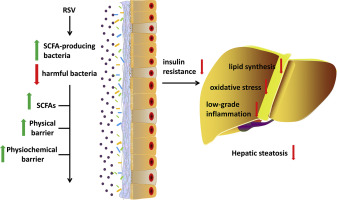The Journal of Nutritional Biochemistry ( IF 5.6 ) Pub Date : 2020-02-27 , DOI: 10.1016/j.jnutbio.2020.108363 Pan Wang 1 , Jing Wang 1 , Daotong Li 1 , Weixin Ke 1 , Fang Chen 1 , Xiaosong Hu 1

|
Resveratrol is a natural polyphenol that has been reported to reduce the risk of obesity and nonalcoholic fatty liver disease (NAFLD). Recent evidence has demonstrated that the gut microbiota plays an important role in the protection against NAFLD and other metabolic diseases. The present study aimed to investigate the relationship between the gut microbiota and the beneficial effects of resveratrol on the amelioration of NAFLD in mice. We observed marked decreases in body weight and liver steatosis and improved insulin resistance in high-fat diet (HFD)-fed mice treated with resveratrol. Furthermore, we found that resveratrol treatment alleviated NAFLD in HFD-fed mice by improving the intestinal microenvironment, including gut barrier function and gut microbiota composition. On the one hand, resveratrol improved gut intestinal barrier integrity through the repair of intestinal mucosal morphology and increased the expression of physical barrier- and physiochemical barrier-related factors in HFD-fed mice. On the other hand, in HFD-fed mice, resveratrol supplementation modulated the gut bacterial composition. The resveratrol-induced gut microbiota was characterized by a decreased abundance of harmful bacteria, including Desulfovibrio, Lachnospiraceae_NK4A316_group and Alistipes, as well as an increased abundance of short-chain fatty acid (SCFA)-producing bacteria, such as Allobaculum, Bacteroides and Blautia. Moreover, transplantation of the HFDR-microbiota into HFD-fed mice sufficiently decreased body weight, liver steatosis and low-grade inflammation and improved hepatic lipid metabolism. Collectively, resveratrol would provide a potentially dietary intervention strategy against NAFLD through modulating the intestinal microenvironment.
中文翻译:

白藜芦醇靶向肠道菌群:肝脂肪变性管理的新证据的证明。
白藜芦醇是一种天然多酚,据报道可降低肥胖和非酒精性脂肪肝疾病(NAFLD)的风险。最近的证据表明,肠道菌群在预防NAFLD和其他代谢疾病中起着重要作用。本研究旨在研究肠道菌群与白藜芦醇对改善小鼠NAFLD的有益作用之间的关系。我们观察到白藜芦醇治疗的高脂饮食(HFD)喂养的小鼠的体重和肝脂肪变性显着降低,并且胰岛素抵抗得到改善。此外,我们发现白藜芦醇治疗通过改善肠道微环境,包括肠道屏障功能和肠道菌群组成,减轻了HFD喂养小鼠的NAFLD。一方面,白藜芦醇通过修复肠粘膜形态改善了肠道小肠屏障的完整性,并增加了HFD喂养小鼠的物理屏障和理化屏障相关因子的表达。另一方面,在HFD喂养的小鼠中,白藜芦醇补充剂可调节肠道细菌组成。白藜芦醇诱导的肠道菌群的特征是有害细菌的丰度降低,包括Desulfovibrio,Lachnospiraceae_NK4A316_group和Alistipes,以及产生短链脂肪酸(SCFA)的细菌(例如同花异色菌,拟杆菌和蓝藻)的丰度增加。此外,将HFDR-微生物群移植到喂食HFD的小鼠中,可充分减轻体重,肝脂肪变性和低度炎症,并改善肝脂质代谢。总的来说,白藜芦醇将通过调节肠道微环境而为NAFLD提供潜在的饮食干预策略。


























 京公网安备 11010802027423号
京公网安备 11010802027423号